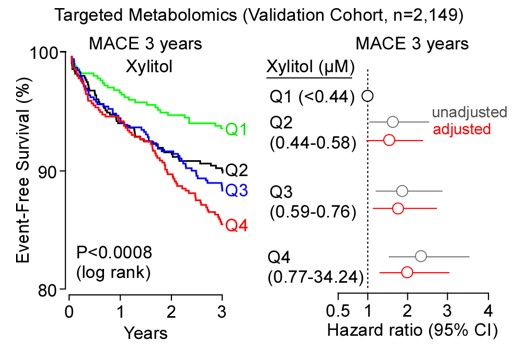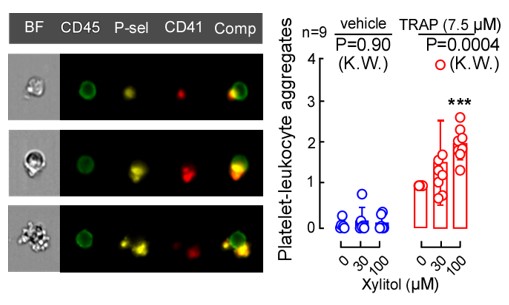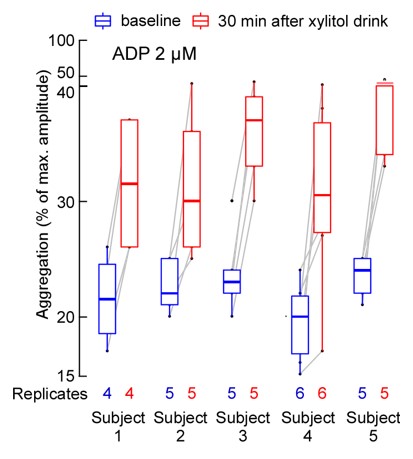Dissecting the effects of endogenous and dietary sweeteners on thrombosis potential and vascular inflammation
Principle Investigator

PD Dr. Tobias Petzold
Scientific interest within the context of the graduate college:
Current preventive efforts mainly focus on the treatment of traditional cardiovascular risk factors (e.g. hypertension and diabetes). However, it is widely known that poor diet is a main risk factor for cardiovascular disease (CVD) that impacts both, gut microbial community structure and metabolic output. Yet, the specific food components promoting CVD and the underlying mechanisms remain for the most part elusive. This lack hampers effective public policy-making to refine primary prevention and improve resilience against CVD and associated complications.

Figure 1. Kaplan Meier plots for MACE stratified by xylitol quartiles (left). Forest plot for HR for MACE +/- adjustment for traditional CVD risk factors (right).
Artificial sweeteners have been widely introduced into the food chain over the past decades due to lower calorie content than sugar and presumed health benefits.
In particular, their use is recommended by multiple health bodies for patients with cardiometabolic disease. Though they are generally recognized as safe (GRAS) by regulatory agencies (e.g. US Food and Drug Administration and European Union), little is known about the long-term health effects of artificial sweeteners. We have recently found that artificial (including non-nutritive and low-calorie) sweeteners (e.g. erythritol and xylitol) are clinically linked with thrombotic event risk in large observational cohort studies and foster prothrombotic phenotypes in vitro (Figure 1, 2) and animal models of arterial injury.1,2 Notably, some of the sweeteners are also produced as low-abundance intermediates in the human glucose metabolism and are therefore present in every patient irrespective of artificial sweetener use.

Figure 2. TRAP6-induced platelet-Leukocyte aggregates in whole blood are increased by xylitol.
Project description:
Introduction: Based on our preliminary and recently reported large-scale clinical observational studies and mechanistic cell-based and animal model studies, we hypothesize that endogenous production and consumption of commonly used sugar substitutes induce a pro-thrombotic and pro-inflammatory state.
In this project, we will first characterize pro-thrombotic and pro-inflammatory effects of commonly used sweeteners (endogenous and dietary non-nutritive and low-calorie sweeteners) in vitro. This approach will be guided by preliminary data from our epidemiological studies where we identified CVD risk thresholds for endogenously produced sweeteners as well as pharmacokinetics studies exploring post-prandial levels of dietary sweeteners following a typical dietary exposure.1,2
In parallel studies, we will quantify direct effects of sweeteners on the platelet phenotype in humans using a prospective interventional study design. In collaboration with the clinical research unit of the Department for Endocrinology of the Charité Campus Benjamin Franklin patients at CVD risk will be enrolled. Acute and chronic effects of sweetener consumption on vascular inflammation and thrombosis potential will be assessed. Participants will receive either a placebo control or candidate sugar substitutes. The study design was informed by our recently conducted clinical trials that tested pro-thrombotic effects of the polyol sweeteners erythritol and xylitol (Figure 3).2,3

Figure 3. ADP-induced aggregation responses in healthy subjects before and after xylitol ingestion.
Aim 1: To test the hypothesis that commonly used sugar substitutes (sucralose, aspartame, saccharine, acesulfam-K, stevia, erythritol, xylitol, sorbitol) impact thrombosis-relevant phenotypes in vitro. We will perform gold standard methods for platelet functional testing, including light transmission aggregometry, flow cytometry, shear flow experiments, immunofluorescence microscopy and imaging flow cytometry.
Aim 2: By using a prospective intervention study design, we will test the hypothesis that acute and chronic exposure to sweeteners alters thrombosis potential in patients at CVD risk. Ex vivo platelet phenotypic changes will be monitored using the above-mentioned methods combined with metabolomics and proteomics studies to explore sweetener-induced metabolic alterations.
Overall, the proposed studies in Aim 1 and 2 will elucidate pro-thrombotic and pro-inflammatory effects of commonly used artificial sweeteners on the vascular phenotype. The results will provide important information to inform public policy-making for CVD prevention and improve the understanding of how sweetener consumption causally contributes to major adverse cardiovascular event risk.
References
- Witkowski M, Nemet I, Alamri H, Wilcox J, Gupta N, Nimer N, […], Landmesser U, Tang WHW, Hazen SL. The Artificial Sweetener Erythritol and Cardiovascular Event Risk. Nat Med. 2023; 29(3):710-718.
- Witkowski M, Nemet I, Li XS, Wilcox J, Ferrell M, Alamri H, […], Wang Z, Tang WHW, Hazen SL. Xylitol is prothrombotic and associated with cardiovascular risk. Eur Heart J. 2024. In press.
- Witkowski M, Wilcox J, Province V, Li XS, Wang Z, Nemet I, Tang WHW, and Hazen SL. Examination of thrombosis potential in subjects before versus following ingestion of the artificial sweetener erythritol. In revision.